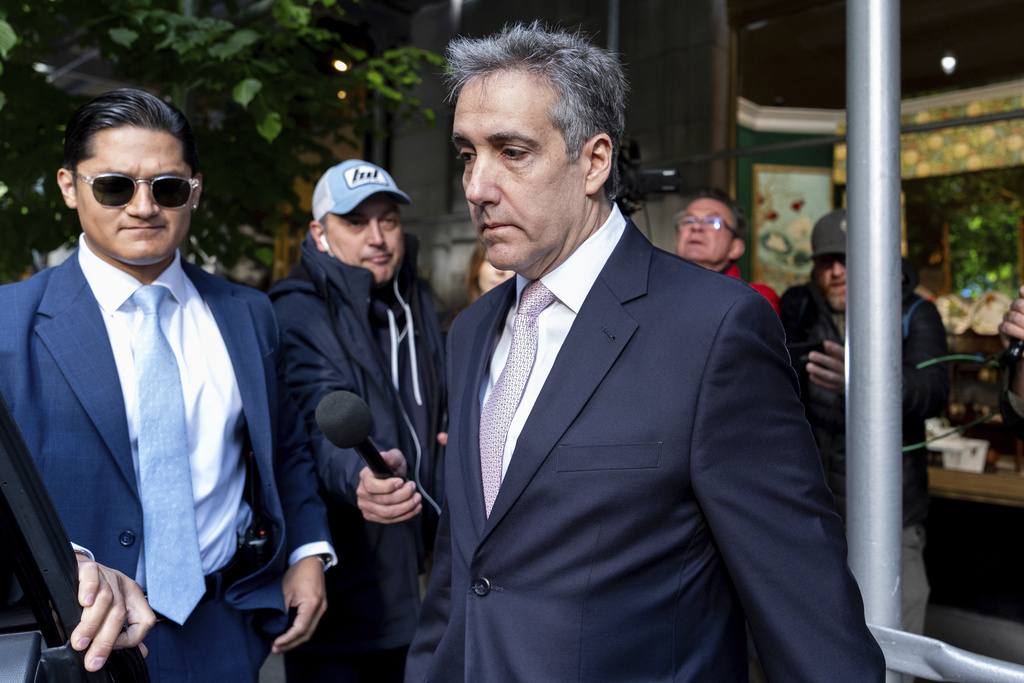Appeals Court Rejects Trump’s Attempt To Scuttle Gag Order Against Insulting Stormy Daniels, Michael Cohen: 45th President Will Now Be Muzzled at Debate
President Trump’s attorneys had made an urgent appeal to have the gag order removed before Trump’s June 27 debate with President Biden.

New York’s highest court, the Court of Appeals, rejected President Trump’s expedited attempt to appeal the gag order imposed on him by the judge, who presides over the hush-money case, according to a decision list published by the court on Tuesday.
Trump had asked for an expedited appeal of the gag order, which restricts him from speaking about witnesses, jurors, court staff, counsel, and the family members of the trial participants, including of the judge and of the Manhattan district attorney, Alvin Bragg, who brought the case against Trump.
“This Gag Order restricts President Trump’s core political speech on matters of central importance at the height of his Presidential campaign, where he is the leading candidate, and thus it violates the fundamental right of every American voter to hear from the leading candidate for President on matters of enormous public importance,” Trump’s defense attorneys wrote on May 15, when they filed the expedited appeal with New York highest court, after a mid-level court had denied their request.
Mr. Bragg’s office argued that the gag order is justified because Trump has a “well-documented history of leveling threatening, inflammatory, and denigrating remarks against trial participants.”

Trump has repeatedly complained that the gag order has stripped him of his “Constitutional Right to Free Speech” by proscribing him from making public comments about two key witnesses in the case, his former lawyer and current nemesis, Michael Cohen, and the adult film star Stormy Daniels, whose real name is Stephanie Clifford, while they are allowed to publicly slander him, as they have been since before the trial started.
He’s also sought to criticize Judge Juan Merchan for bias due to the political activities of his adult daughter, Loren Merchan, who has done campaign work for some of Trump’s most committed enemies such as Vice President Harris and Representative Adam Schiff.
Only the Court of Appeals found “no substantial constitutional question is directly involved” in the restriction.
Judge Merchan issued the gag order on March 26, shortly before the historic criminal trial began, reasoning that the gag order was tailored to protect the integrity of the proceedings and trial participants from receiving violent threats by angry Trump supporters. The Manhattan district attorney’s office had submitted evidence that showed that the threats from Trump supporters against participants increased after Trump’s public comments and insults. On April 1, the judge extended the order to include his own family members, and those of the district attorney, after Trump had continuously attacked Ms. Merchan.

Judge Merchan fined Trump a total sum of $10,000 for violating the gag order ten times during and before the trial, and threatened to send Trump to jail if he continued to make public comments about trial participants.
Trump, who had asked for an expedited ruling, has 30 days to file a motion for leave to appeal, according to court spokesman Gary Spencer. Once that motion is filed, the court will decide again whether or not to hear the case.
Yet that may not be necessary, unless Trump wishes to revoke the fines, because Judge Merchan issued the limited gag order for the duration of the proceedings, which are expected to end when sentencing takes place on July 11.
Trump also filed a motion directly with the judge, asking to remove the restriction in time for his first debate with President Biden on June 27. Only before the judge can rule, the district attorney has to file his answer, and his deadline is June 27, the same day as the debate. Given these circumstances, it seems likely that Trump will head into the presidential debate with the gag order in place. Should Trump choose to violate the order, and decide to speak about Cohen, Ms. Clifford, or Ms. Merchan during the debate, Judge Merchan could order Trump incarcerated just weeks before the Republican National Convention at Milwaukee. When Judge Merchan fined Trump during the trial, he specifically mentioned the prospect of incarceration should he violate the order again.


In January, that same high court that declined to hear Trump’s appeal today refused to hear Trump’s arguments against another gag order, issued by another judge, Arthur Engoron, who presided over Trump’s civil fraud case, also citing no constitutional grounds for an appeal.
The issue of the violent threats made by Trump’s angry supporters appear to be among the principal reasons the courts continue to deny Trump’s gag order appeals. Defense lawyers have argued that Trump should not be held accountable for the actions of third parties; however, the evidence has shown again and again that the threats increase as soon as Trump posts negative statements about someone on social media or makes disparaging comments during his press conferences. The experience of Judge Engoron’s principal law clerk, Allison Greenfield, is instructive. After Trump and his lawyers repeatedly criticized her for bias, “co-judging,” and “rolling her eyes,” Ms. Greenfield, according to court officials, received a large number of hateful comments and threats to her personal cell phone, many of which were said to be antisemitic.

